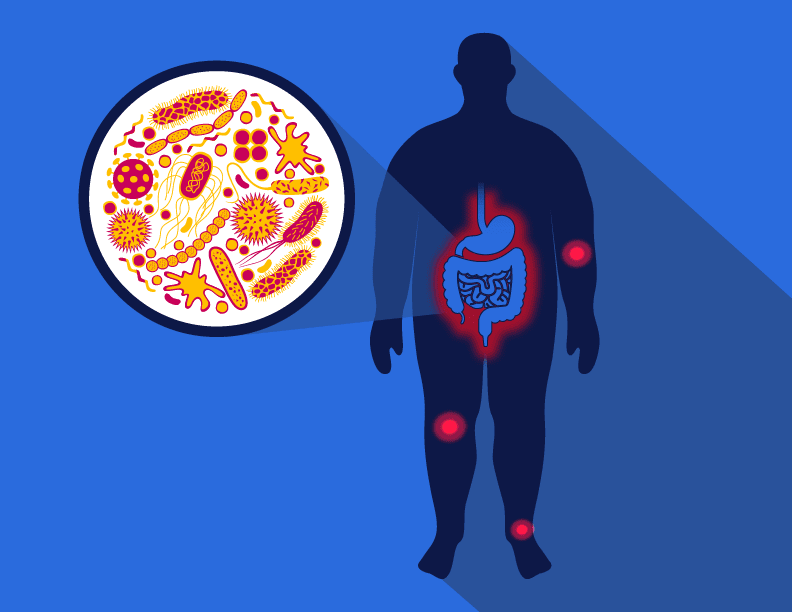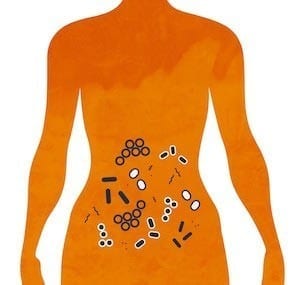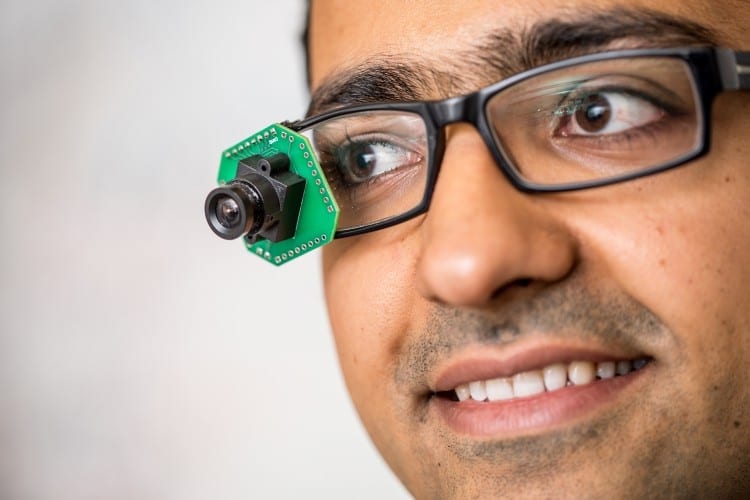
A Prebiotic May Alter the Obese Microbiome and Protect Against Osteoarthritis
Bacteria in the gut, known as the gut microbiome, could be the culprit behind arthritis and joint pain that plagues people who are obese, according to a new study published today in JCI Insight.
Osteoarthritis, a common side effect of obesity, is the greatest cause of disability in the US, affecting 31 million people. Sometimes called “wear and tear” arthritis, osteoarthritis in people who are obese was long assumed to simply be a consequence of undue stress on joints. But researchers at the University of Rochester Medical Center provide the first evidence that bacteria in the gut – governed by diet – could be the key driving force behind osteoarthritis.
The scientists found that obese mice had more harmful bacteria in their guts compared to lean mice, which caused inflammation throughout their bodies, leading to very rapid joint deterioration. While a common prebiotic supplement did not help the mice shed weight, it completely reversed the other symptoms, making the guts and joints of obese mice indistinguishable from lean mice.
What a Western, High Fat Diet Can Do
The URMC team, led by Michael Zuscik, Ph.D., associate professor of Orthopaedics in the Center for Musculoskeletal Research (CMSR), Robert Mooney, Ph.D., professor of Pathology and Laboratory Medicine, and Steven Gill, Ph.D., associate professor of Microbiology and Immunology, fed mice a high fat diet akin to a Western ‘cheeseburger and milkshake’ diet.
Just 12 weeks of the high fat diet made mice obese and diabetic, nearly doubling their body fat percentage compared to mice fed a low fat, healthy diet. Their colons were dominated by pro-inflammatory bacteria, and almost completely lacked certain beneficial, probiotic bacteria, like the common yogurt additive Bifidobacteria.
The changes in the gut microbiomes of the mice coincided with signs of body-wide inflammation, including in their knees where the researchers induced osteoarthritis with a meniscal tear, a common athletic injury known to cause osteoarthritis. Compared to lean mice, osteoarthritis progressed much more quickly in the obese mice, with nearly all of their cartilage disappearing within 12 weeks of the tear.
“Cartilage is both a cushion and lubricant, supporting friction-free joint movements,” said Zuscik. “When you lose that, it’s bone on bone, rock on rock. It’s the end of the line and you have to replace the whole joint. Preventing that from happening is what we, as osteoarthritis researchers, strive to do – to keep that cartilage.”
Can You Eat Your Cake and Protect Your Joints, Too?
Surprisingly, the effects of obesity on gut bacteria, inflammation, and osteoarthritis were completely prevented when the high fat diet of obese mice was supplemented with a common prebiotic, called oligofructose. The knee cartilage of obese mice who ate the oligofructose supplement was indistinguishable from that of the lean mice.
Prebiotics like oligofructose cannot be digested by rodents or humans, but they are welcome treats for certain types of beneficial gut bacteria, like Bifidobacteria. Colonies of those bacteria chowed down and grew, taking over the guts of obese mice and crowding out bad actors, like pro-inflammatory bacteria. This, in turn, decreased systemic inflammation and slowed cartilage breakdown in the mice’s osteoarthritic knees.
Oligofructose even made the obese mice less diabetic, but there was one thing the dietary supplement didn’t change: body weight.
Obese mice who were given oligofructose remained obese, bearing the same load on their joints, yet their joints were healthier. Just reducing inflammation was enough to protect joint cartilage from degeneration, supporting the idea that inflammation – not biomechanical forces – drive osteoarthritis and joint degeneration.
“That reinforces the idea that osteoarthritis is another secondary complication of obesity – just like diabetes, heart disease, and stroke, which all have inflammation as part of their cause,” said Mooney. “Perhaps, they all share a similar root, and the microbiome might be that common root.”
Before You Head to the Vitamin Shop
Though there are parallels between mouse and human microbiomes, the bacteria that protected mice from obesity-related osteoarthritis may differ from the bacteria that could help humans. Zuscik, Mooney and Gill aim to collaborate with researchers in the Military and Veteran Microbiome: Consortium for Research and Educationat the U.S. Department of Veteran’s Affairs to move this research into humans.
The team hopes to compare veterans who have obesity-related osteoarthritis to those who don’t to further identify the connections between gut microbes and joint health. They also hope to test whether prebiotic or probiotic supplements that shape the gut microbiome can have similar effects in vets suffering from osteoarthritis as they did in mice.
“There are no treatments that can slow progression of osteoarthritis – and definitely nothing reverses it,” said first author Eric Schott, Ph.D., postdoctoral fellow in the CMSR and soon-to-be clinical research scientist at Solarea Bio, Inc. “But this study sets the stage to develop therapies that target the microbiome and actually treat the disease.”
Learn more: The Bugs in Your Gut Could Make You Weak in the Knees
The Latest on: Gut microbiome
[google_news title=”” keyword=”gut microbiome” num_posts=”10″ blurb_length=”0″ show_thumb=”left”]
via Google News
The Latest on: Gut microbiome
- Gut microbiome study challenges established cancer biomarkers, identifies new bacterial links to colorectal canceron May 1, 2024 at 9:51 pm
In a recent study published in the journal Nature Medicine, a European team of researchers quantitatively characterized the microbiome profile to study the association between gut microbiota and ...
- Microbiome Perturbations in Male Mice Increase Offspring’s Disease Riskon May 1, 2024 at 5:31 pm
Disrupting the gut microbiome of male mice increases the probability that their offspring are born with low weight and will die prematurely.
- Trio of scientists to unlock mystery, power of microbiomeon May 1, 2024 at 10:39 am
A cluster hire of three microbiome scientists could link microscopic biological community dynamics with soil, plant, animal and human health.
- Cranberry Extracts Boost the Gut Microbiomeon May 1, 2024 at 9:16 am
As to why the cranberry extracts caused such a microbial mix-up, the INAF team surmised that the supplements’ polyphenols had an antimicrobial effect on the Bacteroides bacteria, allowing the ...
- Father’s gut microbes affect the next generationon May 1, 2024 at 8:05 am
The gut microbiota is the microbial community that occupies the gastrointestinal tract. It is responsible for producing enzymes, metabolites, and other molecules crucial for host metabolism and in ...
- Father's gut microbes affect the next generation in mouse studyon May 1, 2024 at 8:00 am
A study from the Hackett group at the European Molecular Biology Laboratory (EMBL) in Rome shows that disrupting the gut microbiome of male mice increases the risk of disease in their future offspring ...
- Father's gut microbiome may affect infant healthon May 1, 2024 at 8:00 am
This suggests that a father’s gut microbiome may impact infant health. Plenty of research has established a link between microbes in mothers and infants, yet little is known about the impact of ...
- 4 Supplements You Shouldn't Take for Gut Health, According to Dietitianson May 1, 2024 at 7:54 am
Supplements are all the rage for gut health, but without a balanced diet, some could be doing more harm than good.
- Gut bacteria and urinary infections linked, offering new angles for treatmenton April 30, 2024 at 7:25 pm
A study in eClinicalMedicine explores the relationship between gut microbiota, urinary tract colonization, and recurrent urinary tract infections (rUTI), suggesting the cross-habitation of ...
via Bing News










